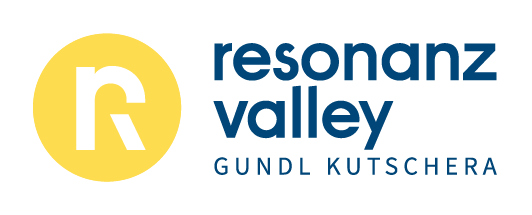Research
Overarching research
Holistic approach to health - family/children - work - culture/society
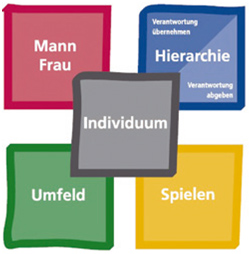
Research questions
- What does it mean to be holistically healthy?
- What are the new role models?
- What does quality of life mean?
- What does personal responsibility mean?
Research Design
Comparable results due to:
- Standardized topics and questions
- Standardized approach within the trainings
- Standardized interviews
- Standardized questionnaires
- Standardized evaluation
- Trainers with the same education and ongoing quality assurance
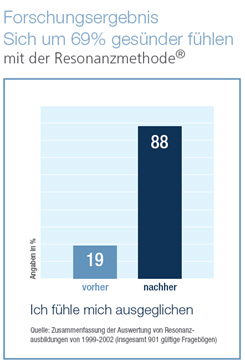 Health
Health
Resonance Valley explores how body, mind and spirit can work together as one, what holistic health can be.
Are you in resonance, then ...
- feel your own body and know what you need. You live the variety of your feelings and choose your thoughts freely. (Individual)
- you feel good as a woman or man. You enjoy your beauty and attractiveness. (woman / man)
- on the one hand, you acknowledge your responsibility - and on the other hand, you also like to be pampered. (Hierarchy)
- preserve the curiosity and playful discovery of your childhood. (Play)
- choose your friends, your sports and cultural activities, and your social engagement. (environment)
Family & Relationship
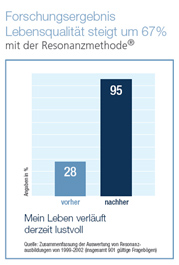
Resonance Valley explores how families can be designed where everyone likes to come and everyone likes to live. Relationship and family - more quality in living together.
If relationship partners are in resonance, then ...
- they feel free as an individual. (Individual)
- they preserve and refine the vivid feeling of happiness of being in love for the first time. (woman / man)
- they commit to each other, care for each other, and gladly accept mutual support. (Hierarchy)
- they can be merry and frolic with each other. (Play)
- they are integrated into the social network of their environment (surroundings)
Children & Youth
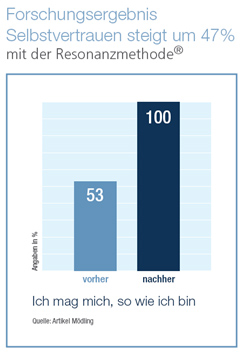
Resonance Valley explores how to make children and young people internally strong so that they can successfully master their lives and move into the future with confidence. "Moving into a positive future with curiosity and open-heartedness."
If children and young people are resonant, then ...
- they know and feel for themselves what they need and when they are done with their schoolwork. (Individual)
- they grow into their role as woman or man with curiosity and naturalness. (woman / man)
- it is easy for them to organize their tasks themselves within the given framework - and they are pleased with their progress. (Hierarchy)
- they have enough time to play alone or with friends. (Play)
- they discover their environment with pleasure and passion: nature, sports, culture, the community, the world of work, ... (environment)
School & Teachers

Resonance Valley explores how we can design schools where everyone likes to come and everyone likes to learn. "Children and youth who are strong on the inside successfully master school and life."
If teachers are resonant, then ...
- they feel comfortable in their body and decide for themselves which feelings and thoughts they want to live. (Individual)
- they are a living example to their students as a woman or man. (woman/man)
- they provide a protective framework within which the free development of the students is possible, and respect and honor the children in their uniqueness. (Hierarchy)
- they can also be playful with students, parents and colleagues. (Play)
- they are integrated into a framework that goes beyond the school and enriches the life of the school. (Environment)
Business
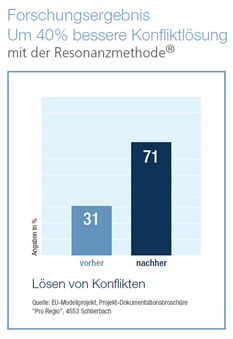
Resonance Valley explores how psychosocial health can be applied to professional and personal lives. "Resonant leaders and employees get better results faster."
If managers and employees are in resonance, then ...
- they live up to their potential in their operational tasks. (Individual)
- they enrich each other as women and men with their special abilities - instead of fighting otherness. (woman/man)
- they lead employees with respect and responsibility and at the same time can accept help and support from others. (Hierarchy)
- they bring in their individual strengths playfully in the team. (Play)
- they are aware of the holistic interaction between society, nature and the economy and act responsibly. (environment)
Books
- Kutschera, Gundl (2011): Salutogenesis in the resonance method. In Petzold, Theodor Dierk; Lehmann, Nadja (Eds.): Communication with Future. Salutogenese und Resonanz; Bad Gandersheim: Verlag Gesunde Entwicklung.
- Kutschera, Gundl (2011): Trance 1. journeys to your self. Vienna: Institut Kutschera.
- Csillag, Charlotte; Kutschera, Gundl (2008): The stories of Susi and Funki. Vienna: Institut Kutschera.
- Kutschera, Gundl (2007): Dance between Consciousness and Unconsciousness: An NLP Work and Training Book. 4th ed., Paderborn: Junfermann.
- Kutschera, Gundl (2003): Desiring each other anew: New momentum for your partnership. 2nd ed., Munich: Kösel-Verlag.
- Kutschera, Gundl; Weiner, Christine (2002): Who wants to be beautiful, must love himself: sensual self-coaching for women. 3rd ed., Munich: Kösel-Verlag.
- Kutschera, Gundl; Carl, Roswitha; Pfeffer, Simone (1999): Resonance in Partner Relationships. NLP - living in harmony with each other. Paderborn: Junfermann.
- Kutschera, Gundl; Harbauer, Eva-Maria (1997): Living in resonance and daring to start anew. Further phantasy journeys in NLP. Paderborn: Junfermann.
- Kutschera, Gundl; Harbauer, Eva-Maria (1996): Living in resonance through the power of your source. Fantasy journeys in NLP. Paderborn: Junfermann.
- Kutschera, Gundl; Bachler, Peter (1995): Learning resonance with NLP. Handbook for multi-level communication. Paderborn: Junfermann.
Research Reports
- Kutschera, Stefan (2014): Results of the NMS Kapfenberg school project. Teambuilding, new learning strategies, violence & crisis prevention for Hauptschulen (NMS) in Kapfenberg. Research report. Vienna. Download PDF
- Kutschera, Stefan (2010): Results of the school projects funded by FGÖ (Fonds Gesundes Österreich). Research report, Vienna. Download PDF
- Kutschera, Gundl; Kutschera, Andrea (2008): Theory social competence in the resonance method. Published as part of the project "Social Competence in Upper Austria" on behalf of EDUHI. Vienna. Download PDF
- Kutschera, Gundl (2007): Teaching self - and social competence. Dargestellt am Beispiel der Europahauptschule Mödling, February 2005 in: Jabornegg Altenfels, Markus (ed.); Schriftenreihe Soziale Kompetenz: Theoretische Fundierung und Analyse des Status Quo in der oberösterreichischen Bildungs- und Wirtschaftslandschaft. Linz. Download PDF
- Kutschera, Gundl (2007): Soziale Kompetenz und ihr Bezug zu Persönlichkeit, Familie und Gesellschaft. in: Jabornegg Altenfels, Markus (Ed.); Schriftenreihe Soziale Kompetenz: Theoretische Fundierung und Analyse des Status Quo in der oberösterreichischen Bildungs- und Wirtschaftslandschaft. Linz. Download PDF
- Kutschera, Stefan (2006): Evaluation results: Life project large-scale enterprises. Training period: October 2005 - February 2006. Vienna. Download PDF
- Kutschera, Gundl; Moldan, Sabine; Zapotoczky, Klaus (2005): Teaching self and social competence. An investigation at the Europahauptschule Mödling. Research report. Linz. Download PDF
- Kutschera, Gundl; Waidhofer, Michael (2003): Research report. Interim results of the ongoing evaluation of a children's learning program. Maria Enzersdorf. Download PDF
- Waidhofer, Michael (2003): Evaluation of nlp resonance seminars 1999 to 2002. research report: 900 questionnaires. In cooperation with Univ. Prof. Zapotoczky of the Johannes Kepler University. Linz. Download PDF
- EU Model Project (1999): "Top Companies in a Top Region", project documentation brochure, Pro Regio, 4553 Schlierbach 19. Download PDF
Theses
- Hoffmann, Andrea (2008): Lifeworld of 1st generation elementary school children from migrant families. Vienna
- Kutschera, Stefan (2008): Images and values of social competence among managers from SMEs. Vienna.
- Hoffmann, Andrea (2007): Work-Life Balance: New Role Models for Reconciling Family and Work - Structural and Emotional Decoupling of the Old Family and Work Structures. Vienna.
- Erker, Stefanie (2007): Burnout syndrome: causes and coping strategies considering personality- and structure-centered approaches. Vienna
- Granich, Klaudia (2007): Employee Ownership - Mission Possible? A working corporate concept? Vienna.
Admission work
- Hußenether, Bianca Anita (2012): Holistic coping strategies for demands on teacher personality. Admission thesis for the 1st state examination. Babenberg: Otto-Friedrich University.
- Weinrich, Josefine (2012): Coaching as a teaching principle. Admission thesis for the 1st state examination. Babenberg: Otto-Friedrich University.
Dissertation
- Waidhofer, Michael (2004): Social competence in discourse. With examples of social interventions in the school context. Linz.
